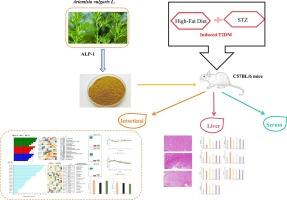青蒿多糖通过调节 2 型糖尿病小鼠的肠道微生物群和血清代谢改善高血糖症状
IF 3.8
2区 农林科学
Q2 FOOD SCIENCE & TECHNOLOGY
引用次数: 0
摘要
本文研究了青蒿多糖(ALP-1)对高脂饮食/链脲佐菌素诱导的糖尿病小鼠的降血糖作用及其机制。口服 ALP-1 4 周后,与 DM 组相比,HALP-1 糖尿病小鼠组的肝指数降低了 27.2%,空腹血糖降低了 10.3%,糖化血清蛋白降低了 14.19%。此外,氧化应激、炎症反应和血清胰岛素水平也有所改善。此外,HALP-1 组的糖耐量、肝糖原水平和胰岛素敏感性都有所提高。此外,ALP-1 还能增加 SCFAs 的含量,尤其是糖尿病小鼠肠道内容物和粪便中的正丁酸。肠道菌群结果显示,ALP-1 能增加糖尿病小鼠盲肠中 Allobaculum 属的数量。粪便微生物群移植和抗生素治疗的结果证实,ALP-1 在一定程度上通过调节肠道菌群发挥降糖作用。我们的研究结果表明,ALP-1 有可能通过调节肠道微生物群和血清代谢来改善高血糖。本文章由计算机程序翻译,如有差异,请以英文原文为准。

Artemisia argyi polysaccharide ameliorates hyperglycemia through modulating gut microbiota and serum metabolism in type 2 diabetic mice
In this manuscript, we investigated the hypoglycemic effect and mechanism of Artemisia argyi polysaccharide (ALP-1) on high-fat diet/streptozotocin-induced diabetes mice. After 4 weeks of oral administration of ALP-1, the HALP-1 diabetic mice group showed a 27.2 % reduction in liver index, a 10.3 % decrease in fasting blood glucose, and a 14.19 % decrease in glycated serum protein compared to the DM group. Additionally, improvements were observed in oxidative stress, inflammatory response, and serum insulin levels. Furthermore, the HALP-1 group exhibited enhanced glucose tolerance, liver glycogen level, and insulin sensitivity. Moreover, ALP-1 could increase the abundance of SCFAs, especially n-butyric acid in intestinal contents and faeces of diabetes mice. Intestinal flora results showed that ALP-1 treatment increased the abundance of genus Allobaculum in the cecum of diabetic mice. The results of fecal microbiota transplantation and antibiotics treatment confirmed that ALP-1 exerts hypoglycemic effect through regulating intestinal flora to a certain extent. The findings of our investigation indicate that ALP-1 has the potential of ameliorate hyperglycemia through modulating gut microbiota and serum metabolism.
求助全文
通过发布文献求助,成功后即可免费获取论文全文。
去求助
来源期刊

Journal of Functional Foods
FOOD SCIENCE & TECHNOLOGY-
CiteScore
9.60
自引率
1.80%
发文量
428
审稿时长
76 days
期刊介绍:
Journal of Functional Foods continues with the same aims and scope, editorial team, submission system and rigorous peer review. We give authors the possibility to publish their top-quality papers in a well-established leading journal in the food and nutrition fields. The Journal will keep its rigorous criteria to screen high impact research addressing relevant scientific topics and performed by sound methodologies.
The Journal of Functional Foods aims to bring together the results of fundamental and applied research into healthy foods and biologically active food ingredients.
The Journal is centered in the specific area at the boundaries among food technology, nutrition and health welcoming papers having a good interdisciplinary approach. The Journal will cover the fields of plant bioactives; dietary fibre, probiotics; functional lipids; bioactive peptides; vitamins, minerals and botanicals and other dietary supplements. Nutritional and technological aspects related to the development of functional foods and beverages are of core interest to the journal. Experimental works dealing with food digestion, bioavailability of food bioactives and on the mechanisms by which foods and their components are able to modulate physiological parameters connected with disease prevention are of particular interest as well as those dealing with personalized nutrition and nutritional needs in pathological subjects.
 求助内容:
求助内容: 应助结果提醒方式:
应助结果提醒方式:


